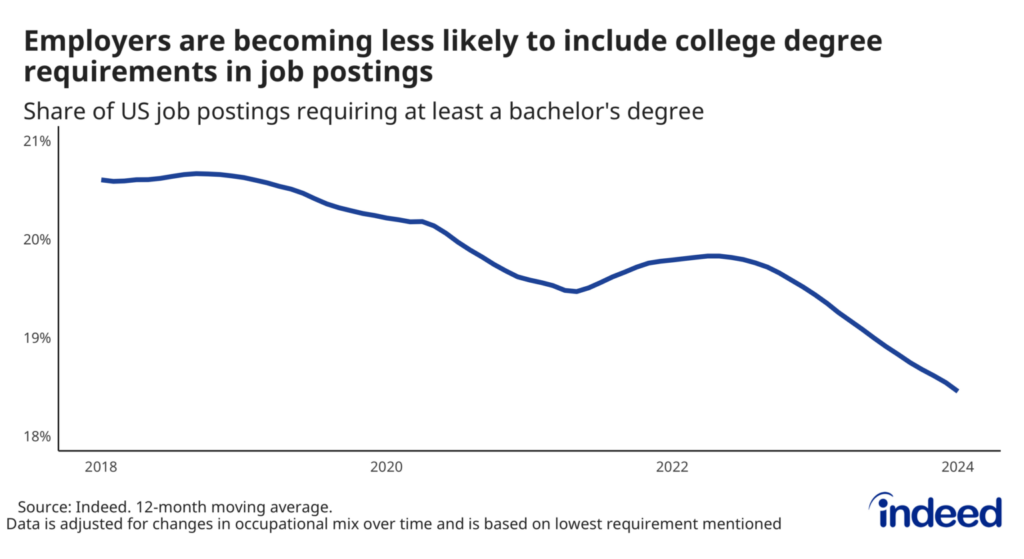JPMorgan Chase is making a significant hiring shift. The company now prioritizes skills over traditional academic credentials. Nearly 70% of job postings for experienced hires no longer require a college degree.
The financial giant wants to create more opportunities for a broader range of job seekers. By removing degree barriers, they aim to reach individuals with the right expertise but no formal higher education.
This change supports workforce diversity and economic mobility.
Companies are realizing that skills and experience often outweigh a degree. Many roles do not require formal education, yet traditional hiring favors degree holders. JPMorgan Chase is challenging that norm.
By eliminating unnecessary barriers, they are setting a new precedent. Other companies may follow their lead, and a skills-based hiring model could reshape the job market.
The job market is changing. Technological advancements and automation alter the skills required for success, so workers must continually adapt.
JPMorgan Chase understands this shift. The company invests in training and upskilling its workforce, funding over 500 education and training programs to help employees grow.
This support significantly benefits employees. Skill-building opportunities help them advance in their careers, and learning programs align with industry demands and evolving business needs.
This hiring shift benefits both the company and job seekers. It expands the talent pool and creates more diverse perspectives. A workforce built on skills fosters innovation and inclusivity.
Economic mobility is another advantage. Those without degrees can now access well-paying jobs, and a skills-based model levels the playing field.
JPMorgan Chase’s new hiring approach could influence the entire industry, and other corporations may adopt similar policies.
Workforce trends are evolving. Companies value adaptability, problem-solving, and digital literacy. Practical knowledge is becoming more important than degrees.
JPMorgan Chase is ahead of the curve. It recognizes that the job market demands agility, and its hiring approach reflects this understanding.
Emphasizing skills sets an example for others. Businesses that prioritize abilities over formal education create stronger, more capable workforces. The labor market is shifting toward merit-based hiring.
JPMorgan Chase is not just responding to trends. It is shaping the future of employment, encouraging a more inclusive and competitive job market.
The transition to skills-first hiring is gaining momentum. As more companies adopt this mindset, ability-based hiring could become the new standard.

As businesses take note, the workforce will transform. A merit-based model fosters fairness and efficiency. It allows talent to rise based on skills, not just academic credentials.
This change has a far-reaching impact, benefiting workers, businesses, and the economy. A shift toward skills-driven employment is reshaping how companies build their teams.
The idea of hiring based on ability is gaining traction. Many industries are recognizing that a degree does not always equate to skill. Competency-based hiring offers an alternative approach.
Training programs are crucial in this transition. Companies are investing in workforce development to ensure employees have relevant skills. It prepares workers for evolving job demands.
JPMorgan Chase’s initiative may push other firms to rethink their hiring strategies. More corporations could adopt training models emphasizing experience over formal education, and the job market would evolve accordingly.
Reducing barriers to entry increases workforce diversity. Candidates from non-traditional backgrounds gain access to new opportunities, leading to a richer talent pool.
Additionally, skill-based hiring benefits employees in career transitions. Many professionals seek new fields but lack degrees in those areas, but their experience can still be valuable.
JPMorgan Chase’s efforts align with a more significant movement. The future of work prioritizes adaptability, continuous learning, and relevant expertise. Companies that embrace this model will remain competitive.
Businesses that invest in employee development will thrive. Continuous learning ensures the workforce remains dynamic, and career growth becomes a shared responsibility between employers and workers.
JPMorgan Chase has set a new standard in recruitment. Their hiring policies reflect a shift towards fairness and merit. This approach fosters inclusion and accessibility.
The move signals a broader industry transformation. Traditional hiring models are becoming outdated, and more organizations will likely follow suit.
This hiring shift impacts not only the corporate world but also higher education. Universities may need to adjust curricula to align with evolving industry demands, and the focus on practical skills will grow.
Employers must adapt to an increasingly digital workplace. Skills in technology, problem-solving, and communication are essential. Companies that invest in these areas will secure top talent.
JPMorgan Chase is paving the way for a more inclusive job market. Their strategy could redefine how businesses assess talent, and the emphasis on skills may soon become the norm across industries.
This transformation benefits everyone involved. Job seekers gain fairer access to employment, and companies build stronger, more capable teams.
The ripple effect of skills-based hiring will extend beyond finance. Other sectors will likely follow this path, and the global workforce will experience a major shift.
By prioritizing abilities over degrees, companies create a more equitable workplace. Success will be determined by capability, not credentials. JPMorgan Chase’s hiring strategy is leading the way.
- 107shares
- Facebook Messenger
About the author
Abdul Rasid is a Senior Contributor at DbdPost, specializing in crafting well-researched and insightful content across a variety of topics. With years of experience in journalism and online publishing, Abdul is known for his attention to detail and ability to present complex ideas in an engaging, reader-friendly manner. His work reflects a commitment to accuracy and delivering value to his audience, making him a trusted voice in the digital space.





